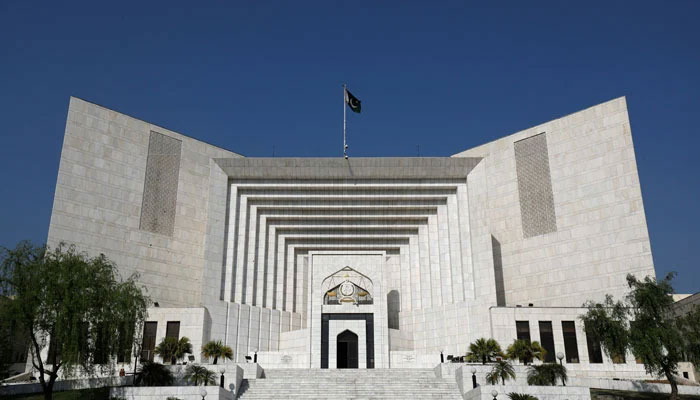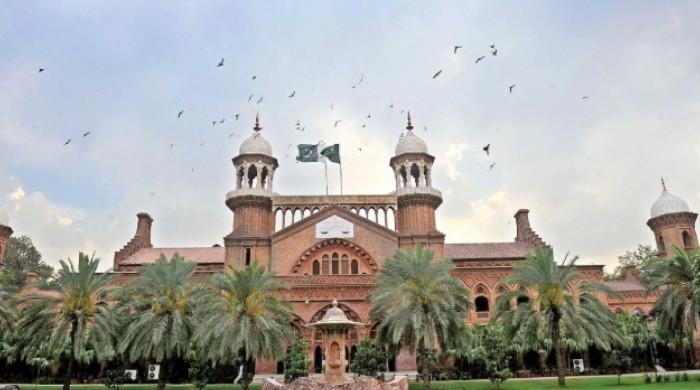SC withdraws contempt notice, urges CJP to establish full court on committees' powers
Additional registrar did not deliberately violate court order, reads judgment of two-member bench
January 27, 2025

- Two-member bench's verdict finds no evidence of mala fide intent.
- Says two concerned committees deprived regular bench of powers.
- Wants full court to authoritatively decide on issue once and for all.
ISLAMABAD: The Supreme Court withdrew the contempt notice against Additional Registrar (Judicial) Nazar Abbas and dispatched the file to Chief Justice of Pakistan (CJP) Yahya Afridi for the constitution of full court on the powers of committees that decide to fix cases before benches.
"We find that he [Additional Registrar (Judicial)] did not deliberately avoid the fixation of the cases before the bench as directed in the court order [....] The show-cause notice issued against him for contempt proceeding is discharged," read the 20-page verdict issued by the two-member bench comprising Justice Mansoor Ali Shah and Justice Aqeel Ahmed Abbasi.
The case is concerned with the legal conundrum arising out of erred fixing of cases — which included a challenge to the vires of Custom Act 1969 — by Additional Registrar (Judicial) Nazar Abbas, who wrongly fixed cases meant for the Supreme Court's constitutional bench instead of a regular one.
During the subsequent hearings, it was revealed that the case was not fixed for hearing and was, instead, later transferred to the constitutional bench, after which the the two-member bench comprising Justice Shah and Justice Aqeel Ahmed Abbasi issued a show-cause notice to Abbas.
In the judgment today, the court accepted the additional registrar's argument — submitted before the court in his reply to the show-cause notice — that he had no authority to constitute the bench of judges and at most inform the competent authority, which he did in a timely manner.
"The alleged contemner’s failure to fix the case before the Bench specified in the court order, therefore, does not constitute a contumacious act on his par," said the verdict.
"Upon examining the case of the present alleged contemner, the Additional Registrar (Judicial) of this Court, we find that he did not deliberately avoid the fixation of the cases before the Bench as directed in the court order.
"There is no evidence to suggest that he had any personal interest in the matter or had connived with any of the parties to the case, nor did he act with the intention of causing damage to any of the parties to the case. There is no indication of mala fide intent in his actions," it adds.
'No authority to withdraw case'
On the much contentious issue of the powers of the SC (Practice and Procedure) Act, 2023 and the constitutional bench committee constituted under Article 191-A, the two-member bench raised two separate questions of law.
The first issue it pondered upon was whether the said committees had the authority to withdraw a case from a bench in which cognisance has already been taken by a regular bench.
Answering this in the negative, the judgment said that the well-established practice that once a case was assigned to a bench and that bench has taken seisin — assumed jurisdiction — of the matter and partly heard it the chief justice could not "unilaterally withdraw it and reassign it to another bench except under specific, judicially recognised circumstances".
Citing the high constitutional value of judicial independence whereby a bench enjoys the freedom and independence to adjudicate upon a lis — pending case — it has taken cognisance of, the court maintained that when a bench has partly heard a case, the matter then becomes part of judicial proceedings, and the bench hearing the case assumes exclusive jurisdiction over it.
"Any interference — whether through withdrawal or reassignment — without judicial justification undermines the principle of judicial independence," it noted.
Lamenting that the arbitrary reconstitution of benches undermines the integrity of the judicial system and may have serious repercussions, the verdict said that the chief justice's powers do not extend to withdrawing or transferring a part-heard case from a bench that has already assumed jurisdiction.
"Arbitrary withdrawal or reassignment of a case after it has been partly heard sets a dangerous precedent, undermines the sanctity of judicial proceedings and erodes public confidence in the judiciary," it warned.
"We hold that the Committees constituted under Sections 2 of the Act and 191A of the Constitution lack the authority to withdraw a case that has been partly heard, where cognisance has already been taken by a regular bench, and transfer it to another bench, unless the bench itself refers the case to the committees for its assignment to another Bench for some justifiable reason," it concluded.
Meanwhile, the second question of law related to whether the committees could undo the effect of a judicial order — whereby the next hearing of a specific case has been fixed before a regular bench — and the court found out that the aforesaid bodies lacked such powers.
"It can be held unequivocally that no administrative authority, including the committees, constituted under Section 2 of the Act and 191A of the Constitution, can, by an administrative order, undo the effect of a judicial order," said the judgment.
"We find that it was the administrative decisions of the Committees that illegally nullified the judicial orders and unlawfully deprived the regular Bench of its judicial power to decide the jurisdictional question raised before it," it added.
'Full court to decide once and for all'
Deliberating whether the court should proceed further against the members of the two committees for unlawful withdrawal, transfer of case and disregard for the judicial order passed by the regular bench, the judgment said that the matter was to proceed further against the members of the two committees.
However, citing judicial propriety and decorum, the verdict said that the said question should "be considered and decided by the full court of the SC so that it is authoritatively decided once and for all".
We refer this matter to the Hon’ble Chief Justice for the convening of the full court to deliberate and decide on this important issue," it added.
What had happened?
The whole saga revolves around a three-member bench comprising Justice Shah, Justice Ayesha A Malik and Justice Irfan Saadat Khan, which heard certain cases on January 13, 2025.
However, an objection was raised regarding the bench's jurisdiction — which also involved a challenge to the constitutionality of law — on the basis of Article 191A of the Constitution which led to the subsequent adjournment till January 16.
The bench was then reconstituted on January 16 with Justice Abbasi replacing Justice Khan and directed the office to fix these cases before the earlier bench on January 20.
However, the cases were not fixed on the said date with the Deputy Registrar (Judicial) confirming that cases had instead been fixed for hearing before the constitutional bench on January 27 pursuant to the decision of the committee constituted under the Supreme Court (Practice and Procedure) Act, 2023.
With the court initiating suo motu contempt proceedings against Additional Registrar (Judicial) Abbas, the SC Registrar provided copies of the decision made by the practice and procedure committee and the one constituted under Article 191A of the Constitution.
He apprised the court that the practice and procedure committee convened a meeting on January 17 and by a majority decision withdrew the said cases from the regular bench and referred them to the other committee.
The latter body then met on the same day and directed that all cases challenging the vires of the 26th Constitutional Amendment and vires of law be fixed for hearing before the constitutional bench on January 27.









